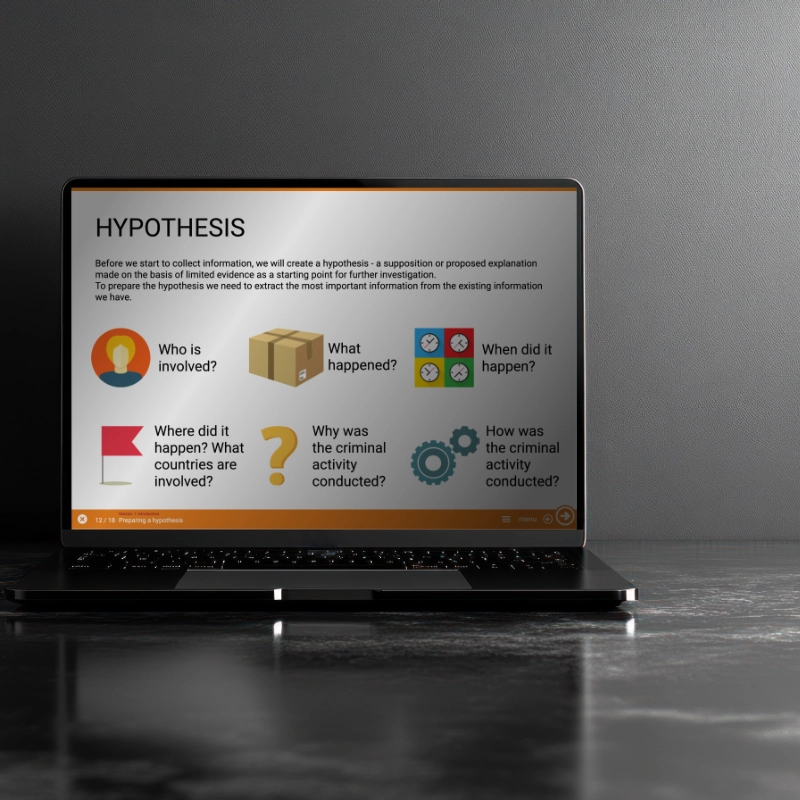Registered users
Ø Course rating
Courses & Practical resources

Basel STUDY
Looking for an advanced qualification in anti-corruption or asset recovery? Check out our postgraduate courses with the University of Basel.
Learn moreКурсове
Име на курс Data Cleaning and Harvesting
In financial investigations, disorganised data can slow you down and hide crucial insights. ...
Име на курс Разузнаване с използване на открити източници
Разузнаването от открити източници (OSINT) играе ключова роля в съвременните разследвания, като ...
Име на курс Международно сътрудничество взаимопомощ по наказателноправни въпроси
Случаите на корупция и пране на пари често изискват разследвания извън ...
Име на курс Collective Action Against Corruption
Collective Action initiatives bring together business, government, and civil society to ...
Име на курс Оперативен анализ
Analysing suspicious transactions related to money laundering and...
Име на курс Финансов анализ с помощта на Excel
За повечето разследващи Excel е предпочитаният инструмент за анализ на финансова ...
Име на курс Визуализиране на случаи и парични потоци
Разследванията на корупция и изпиране на пари често включват сложни мрежи от лица, ...
Име на курс Анализ на източника на финансиране и начина на употреба на средствата
Анализът на източниците и използването на средства е прост, но мощен метод за доказване на ...
Име на курс Борба с финансирането на тероризма
Системите за борба с изпирането на пари (AML) и финансирането на тероризма (CFT) стават все ...
Име на курс Introduction to blockchain: Crypto investigation and AML compliance, 5-8 May
A four-day training course on the fundamentals of crypto, financial crime and anti-money ...
Име на курс Introduction to blockchain: Crypto investigation and AML compliance, 9-12 February
A four-day training course on the fundamentals of crypto, financial crime and anti-money ...
Име на курс ICAR Certified Trainers Community
Welcome!
This platform is dedicated to all ICAR Certified Trainers in Financial Investigations and...
Име на курс Illicit Enrichment Alumni
How to investigate and prosecute the offence of illicit enrichment, also known as possession of ...
Име на курс Financial Investigation / Asset Recovery Alumni
How to use criminal investigative techniques to gather evidence in order to prove different ...
Име на курс Introduction to blockchain: Crypto investigation and AML compliance
A four-day training course on the fundamentals of crypto, financial crime and anti-money ...
Име на курс Survey: Continuing Education for Professionals with the Basel Institute on Governance
This survey aim to assess the needs and interests of professionals in anti-corruption, asset ...
Име на курс Collective Action in practice: a game-changer for business integrity
At its core, Collective Action is a simple yet powerful concept: tackling corruption challenges ...
Име на курс Illicit Enrichment: A Guide to Laws Targeting Unexplained Wealth
Illicit Enrichment by Andrew Dornbierer provides a comprehensive guide to illicit enrichment laws...
Име на курс Guidelines for the efficient recovery of stolen assets
A set of international good practices to enhance the effectiveness and efficiency of ...
Име на курс Guide to the role of civil society organisations in asset recovery
A practical guide to how civil society organisations can play a role in the asset recovery ...
Име на курс Informal governance
Unwritten rules, special favours, “reaching an understanding”. Informality is what happens ...
Име на курс Introduction to Green Corruption
This introduction to Green Corruption consists of four parts:
Part 1 of the learning series ...
Име на курс Non-conviction based confiscation
Criminals exploit legal loopholes, borders and other avenues to conceal the proceeds of their ...
Име на курс Managing seized and confiscated assets
News headlines often focus on the seizure or confiscation of illicit assets, such as cash, ...
Име на курс Financial investigations in a cash economy
This Quick Guide by Emmanuel Mringo provides practical strategies for conducting financial ...
Име на курс Business ethics and integrity
The changing landscape of anti-corruption regulation and enforcement has triggered important ...
Име на курс Border corruption
Border corruption is a complex phenomenon with serious impacts on safety, health and security. ...
Име на курс Strategic corruption
This Quick Guide is the second in a two-part series on the tangible yet under-addressed impacts ...
Име на курс Corruption and security
"Corruption plays a critical role in undermining stability, global governance and international ...
Име на курс Sexual corruption
Sexual corruption is a serious and under-recognised form of both corruption and sexual abuse. A ...
Име на курс Public-private partnerships for financial intelligence sharing
Financial intelligence is the staple food of investigations into corruption, money laundering and...
Име на курс Multi-agency asset recovery task forces
To effectively combat organised and financial crime, it is often necessary for countries to ...
Име на курс Corruption and human rights
Could anti-corruption benefit from a human rights perspective? How can the two communities work ...
Име на курс The disposal and sharing of assets
Asset recovery is a critical tool in the fight against corruption and organised crime. But what ...
Име на курс Asset recovery legislation
Asset recovery tools are integral to combating corruption, organised crime, sanctions evasion and...
Име на курс Informal networks and anti-corruption
Understand the role of informal social networks in enabling corruption, and why anti-corruption ...
Име на курс Money laundering and sanctions evasion using the art market
This quick guide briefly explains the unique characteristics of the art market that make it ...
Име на курс Money laundering through the gambling industry
This quick guide sets out how criminals abuse the gambling industry to launder illicit funds. It ...
Име на курс Court monitoring
This quick guide explains the role of national risk assessments in addressing money laundering ...
Име на курс National risk assessments
This quick guide explains the role of national risk assessments in addressing money laundering ...
Име на курс Tax investigations and illegal wildlife trade
What role could tax investigations play in detecting, investigating and prosecuting cases of ...
Име на курс Internal controls and anti-corruption
Learn what internal controls are and how they help organisations to prevent, detect and respond ...
Име на курс Indonesia: a landmark money laundering conviction in a forestry crime case
Investigators from Indonesia’s Ministry of Environment and Forestry achieved their first-ever ...
Име на курс International cooperation in the Migori County corruption case
Име на курс Using full legal means to confiscate illicit assets in a time of war
In 2014, following Ukraine’s Revolution of Dignity and the deposition of President Viktor ...
Име на курс The Kiamba case: achieving a civil asset forfeiture order and criminal prosecution
In 2014, a suspicious transaction report led Kenya’s Ethics and Anti-Corruption Commission (EACC)...
Име на курс Windward Trading: Charging a shelf company with money laundering and returning confiscated funds to Kenyan citizens
In the Windward Trading case, Kenya and Jersey collaborated to recover and repatriate ...
Име на курс Upholding an unexplained wealth judgement in Kenya's Anglo Leasing affair
In August 2021, Kenya’s High Court upheld a significant unexplained wealth ruling against Patrick...
Име на курс Hout Bay and the illegal lobster trade: a case study in recovering illicit proceeds of IUU fishing and wildlife trafficking
This case study explores how South African authorities, with international collaboration, ...
Име на курс Confiscating assets of the Shining Path terrorist organisation
This case study details the successful confiscation of nearly USD 1 million from a Swiss bank ...
Име на курс The Russian arms dealer case
This case study explores how the Peruvian State successfully used its non-conviction based ...
Име на курс The Kazinda case: Putting Uganda’s illicit enrichment law to good use
In a landmark case for Uganda, Geoffrey Kazinda, former Principal Accountant in the Office of the...
Име на курс From the UK's first Deferred Prosecution Agreement to a plea bargain in Tanzania
The case of From the UK’s first Deferred Prosecution Agreement to a plea bargain in Tanzania high...
Име на курс The Serwamba case: achieving Uganda’s first successful money laundering convictions
The Serwamba case marked Uganda’s first successful money laundering conviction under the 2013 ...
Име на курс Sextortion: an unaddressed form of corruption and sexual abuse
Research findings from Malawi, Tanzania, Uganda and Rwanda raise concerns about the extent and ...
Име на курс Harnessing behavioural approaches against corruption
Social norms and behaviour change (SNBC) approaches are a promising complement to conventional ...
Име на курс Deconstructing a criminal network involved in illegal wildlife trade between East Africa and Southeast Asia
This research deconstructs a transnational criminal network involved in illegal wildlife trade ...
Име на курс Exposing the networks behind transnational corruption and money laundering schemes
A pilot behavioural anti-corruption intervention at a public hospital in Dar es Salaam, Tanzania ...
Име на курс Leveraging informal networks for anti-corruption in East Africa
This research explores how informal networks between citizens, businesspeople, and public ...
Име на курс Targeting corrupt behaviours in a Tanzanian hospital: A social norms approach
A pilot behavioural anti-corruption intervention at a public hospital in Dar es Salaam, Tanzania ...
Your Benefits
Certificate of Completion
Receive a personalised certificate from the Basel Institute on Governance or its International Centre for Asset Recovery
Practical and interactive
Our courses evolve around real cases and you learn practical skills that you can use in your workplace.
Free of charge
All self-paced eLearning courses and our guides are free of charge. Just register, log in and start learning.
Always available
All self-paced eLearning courses are available 24/7. You can start any time - the only requirement is your web browser.
In your language
All of our courses are available in English and many also in other languages including Spanish, French, Portuguese and others.
Integrate Basel LEARN courses
Want to integrate Basel LEARN courses in your professional development programme or want to learn more about creating serious eLearning? Contact us.
Testimonials




